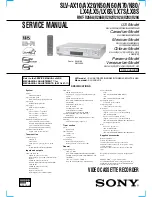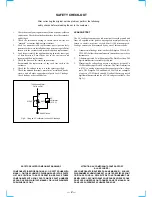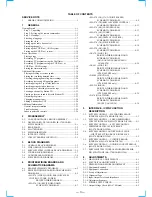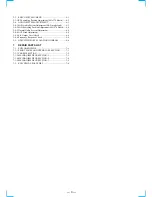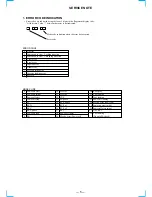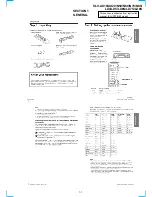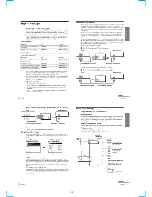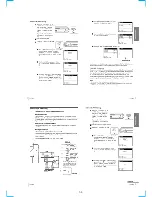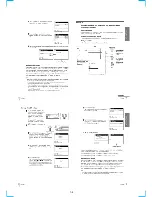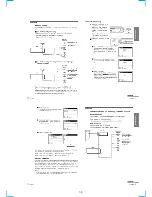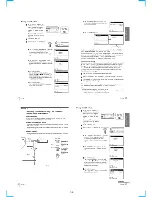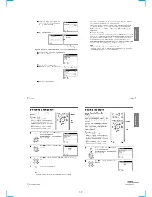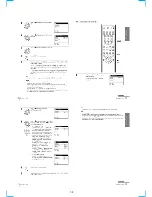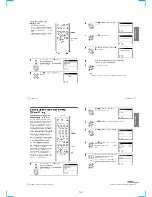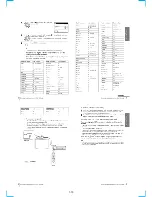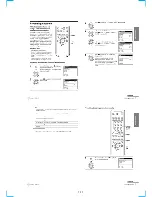
— 2 —
SAFETY CHECK-OUT
After correcting the original service problem, perform the following
safety checks before releasing the set to the customer.
1.
Check the area of your repair for unsoldered or poorly-soldered
connections. Check the entire board surface for solder splashes
and bridges.
2.
Check the interboard wiring to ensure that no wires are
"pinched" or contact high-wattage resistors.
3.
Look for unauthorized replacement parts, particularly
transistors, that were installed during a previous repair. Point
them out to the customer and recommend their replacement.
4.
Look for parts which, though functioning, show obvious signs
of deterioration. Point them out to the customer and
recommend their replacement.
5.
Check the line cord for cracks and abrasion.
Recommend the replacement of any such line cord to the
customer.
6.
Check the B+ voltage to see it is at the values specified.
7.
Check the antenna terminals, metal trim, "metallized" knobs,
screws, and all other exposed metal parts for AC leakage.
Check leakage as described below.
LEAKAGE TEST
The AC leakage from any exposed metal part to earth ground and
from all exposed metal parts to any exposed metal part having a
return to chassis, must not exceed 0.5mA (500 microampers).
Leakage current can be measured by any one of three methods.
1.
A commercial leakage tester, such as the Simpson 229 or RCA
TW-540A. Follow the manufacturers' instructions to use these
instruments.
2.
A battery-operated AC milliammeter. The Data Precision 245
digital multimeter is suitable for this job.
3.
Measuring the voltage drop across a resistor by means of a
VOM or battery-operated AC voltmeter. The "limit" indication
is 0.75V, so analog meters must have an accurate low voltage
scale. The Simpson 250 and Sanwa SH-63Trd are examples
of a passive VOM that is suitable. Nearly all battery operated
digital multimeters that have a 2V AC range are suitable. (See
Fig. A)
To Exposed Metal
Parts on Set
0.15
µ
F
1.5 k
Ω
AC
Voltmeter
(0.75 V)
Earth Ground
Fig. A. Using an AC voltmeter to check AC leakage.
SAFETY-RELATED COMPONENT WARNING!!
COMPONENTS IDENTIFIED BY MARK
0
OR DOTTED LINE WITH
MARK
0
ON THE SCHEMATIC DIAGRAMS AND IN THE PARTS
LIST ARE CRITICAL TO SAFE OPERATION. REPLACE THESE
COMPONENTS WITH SONY PARTS WHOSE PART NUMBERS
APPEAR AS SHOWN IN THIS MANUAL OR IN SUPPLEMENTS
PUBLISHED BY SONY.
ATTENTION AU COMPOSANT AYANT RAPPORT
À LA SÉCURITÉ!
LES COMPOSANTS IDENTIFÉS PAR UNE MARQUE
0
SUR LES
DIAGRAMMES SCHÉMATIQUES ET LA LISTE DES PIÈCES SONT
CRITIQUES POUR LA SÉCURITÉ DE FONCTIONNEMENT. NE
REMPLACER CES COMPOSANTS QUE PAR DES PIÈSES SONY
DONT LES NUMÉROS SONT DONNÉS DANS CE MANUEL OU
DANS LES SUPPÉMENTS PUBLIÉS PAR SONY.
Summary of Contents for RMT-V266A
Page 6: ... 6 MEMO ...
Page 8: ...1 2 ...
Page 9: ...1 3 ...
Page 10: ...1 4 ...
Page 11: ...1 5 ...
Page 12: ...1 6 ...
Page 13: ...1 7 ...
Page 14: ...1 8 ...
Page 15: ...1 9 ...
Page 16: ...1 10 ...
Page 17: ...1 11 ...
Page 18: ...1 12 ...
Page 19: ...1 13 ...
Page 20: ...1 14 ...
Page 21: ...1 15 ...
Page 22: ...1 16 ...
Page 23: ...1 17 ...
Page 24: ...1 18 ...
Page 25: ...1 19 ...
Page 26: ...1 20 ...
Page 27: ...1 21 ...
Page 28: ...1 22 ...
Page 29: ...1 23 ...
Page 30: ...1 24 ...
Page 31: ...1 25 ...
Page 32: ...1 26 ...
Page 33: ...1 27 ...
Page 34: ...1 28E MEMO ...
Page 40: ...2 6E MEMO ...
Page 48: ...4 2 MEMO ...
Page 66: ...4 38E MEMO ...
Page 76: ...MEMO 6 8E ...

